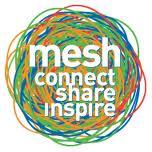 MESH conference in Toronto is all about ideas. Big ideas about social networks – where we are and where we're heading. Questions too. The organizers present some of the world's leading thinkers and innovators who, over two days, share insights and challenge the audience to look at our connected world from a fresh perspective. It's a bit like going back to university – in a good way.
MESH conference in Toronto is all about ideas. Big ideas about social networks – where we are and where we're heading. Questions too. The organizers present some of the world's leading thinkers and innovators who, over two days, share insights and challenge the audience to look at our connected world from a fresh perspective. It's a bit like going back to university – in a good way.
This year was no exception. Here's a summary of my favourite sessions and some of the things I learned.
Patil was the opening speaker, a high energy data scientist in residence at Greylock Partners and former LinkedIn chief scientist, who talked about big data and its impact on our lives. He began with a quick visual experiment using four variables to demonstrate how many options even a simple data set can give us.
Memorable story: The development of LinkedIn's 'People you may know' app and how it originated from an understanding that when we enter any new space whether virtual or IRL, we're self-conscious at first and look for people we know. Once we find them, we become more comfortable and start to feel at home.
Takeaway: When we use data to make decisions we need to have context. Data alone doesn't cause issues, it's the people behind the data that do.
Johnson is co-founder of Blue State Digital, the firm that ran President Obama's first digital campaign. He's also written a book, The Information Diet, about the way we take in junk information and how similar that is to the way we consume junk food. Many of us can't handle the overload and become info-obese. He offers four tips to create a sustainable info diet:
- Consciously consume information, that is, schedule your intake. Meaning those of us who frequently visit our inbox out of habit or kill time on Facebook should modify our behaviour.
- Seek whole news from the source in order to differentiate between truth and processed truth.
- Be a producer. Johnson tries to write 500 words first thing each morning in order to shape his day. After that he checks emails and other feeds.
- Subtract junk. This is something I know from experience as I've unsubscribed for 70+ email newsletters this year and it's really lightened my inbox load and stress level.
Philosopher, Harvard Berkman Center for Internet and Society senior researcher, and author of several books including The Cluetrain Manifesto and Too Big to Know. Weinberger spoke about the importance of networked knowledge – that is knowledge that goes beyond the bounds of books and is messy, entropic and filled with arguments and dissention. Knowledge that has no beginning or end.
He prefers linked data to semantic connections because links offer a predictable format and a uniform system for processing information that computers can easily recognize (i.e. evidence versus facts). He believes this type of knowledge is what will get us closer to a truer understanding of the universe. On another level he used to contribute gags to the Inside Woody Allen syndicated comic strip and likes Reddit because of what he discovers on the site.
DW nuggets:
- The web is full of lies of all sorts; it's a place where you can be as stupid as you want for a long time. That's one of the downsides of scale.
- We learn by assimilating the new to the familiar; that's why the 'echo chamber' – perspectives you agree with – is a good place to start. Then you have to open your mind by visiting sites you may disagree with in order gain an understanding of divergent points of view.
A bit cantankerous, Winer, a research fellow at Harvard Law School, is the guy who invented RSS and ultimately is responsible for web 2.0, blogging, podcasts, etc. He spoke about why he feels there's too much data behind walled platforms (Facebook, Twitter, Google) and the need to liberate it. (You can see data was a recurring theme.) He predicted Twitter will grow into a news service and, because of all its exclusive content challenged the New York Times to compete directly with Twitter.
Memorable story: He told us the tipping point for RSS happened when via a 'back door' he gained access to the New York Times news data, created a feed, was told to take it down, got a call from the publisher and then an exclusive contract to distribute the paper's news by RSS. He said unlike some platforms, he kept RSS open rather than proprietary, which is why he's probably not well suited to be a corporate CEO.
Key takeaway: Winer defined blogging as 'the unedited voice of a person' regardless of the platform they're on. He tries to create individual publishing products that enable people to manage their very complicated web presence in a simple way.
It's hard to find that calibre of speakers in one place year after year. Thanks to the MESH team for continuing to challenge. Now if only there were a MESH degree…

Trackbacks/Pingbacks